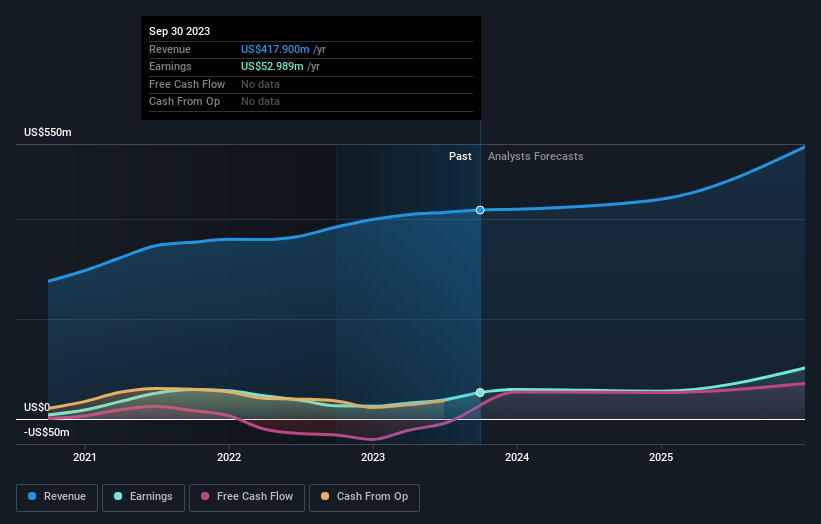Vicor Corporation Just Beat Earnings Expectations: Here's What Analysts Think Will Happen Next
One of the biggest stories of last week was how Vicor Corporation (NASDAQ:VICR) shares plunged 26% in the week since its latest third-quarter results, closing yesterday at US$39.94. It looks like a credible result overall - although revenues of US$108m were in line with what the analysts predicted, Vicor surprised by delivering a statutory profit of US$0.37 per share, a notable 17% above expectations. The analysts typically update their forecasts at each earnings report, and we can judge from their estimates whether their view of the company has changed or if there are any new concerns to be aware of. Readers will be glad to know we've aggregated the latest statutory forecasts to see whether the analysts have changed their mind on Vicor after the latest results.
View our latest analysis for Vicor
Following the latest results, Vicor's three analysts are now forecasting revenues of US$439.6m in 2024. This would be a modest 5.2% improvement in revenue compared to the last 12 months. Statutory per-share earnings are expected to be US$1.19, roughly flat on the last 12 months. Yet prior to the latest earnings, the analysts had been anticipated revenues of US$489.7m and earnings per share (EPS) of US$1.45 in 2024. It looks like sentiment has declined substantially in the aftermath of these results, with a real cut to revenue estimates and a real cut to earnings per share numbers as well.
It'll come as no surprise then, to learn that the analysts have cut their price target 8.4% to US$69.33. There's another way to think about price targets though, and that's to look at the range of price targets put forward by analysts, because a wide range of estimates could suggest a diverse view on possible outcomes for the business. Currently, the most bullish analyst values Vicor at US$75.00 per share, while the most bearish prices it at US$65.00. With such a narrow range of valuations, the analysts apparently share similar views on what they think the business is worth.
Taking a look at the bigger picture now, one of the ways we can understand these forecasts is to see how they compare to both past performance and industry growth estimates. It's pretty clear that there is an expectation that Vicor's revenue growth will slow down substantially, with revenues to the end of 2024 expected to display 4.1% growth on an annualised basis. This is compared to a historical growth rate of 10.0% over the past five years. Compare this against other companies (with analyst forecasts) in the industry, which are in aggregate expected to see revenue growth of 6.8% annually. So it's pretty clear that, while revenue growth is expected to slow down, the wider industry is also expected to grow faster than Vicor.
The Bottom Line
The biggest concern is that the analysts reduced their earnings per share estimates, suggesting business headwinds could lay ahead for Vicor. Unfortunately, they also downgraded their revenue estimates, and our data indicates underperformance compared to the wider industry. Even so, earnings per share are more important to the intrinsic value of the business. Furthermore, the analysts also cut their price targets, suggesting that the latest news has led to greater pessimism about the intrinsic value of the business.
Keeping that in mind, we still think that the longer term trajectory of the business is much more important for investors to consider. At Simply Wall St, we have a full range of analyst estimates for Vicor going out to 2025, and you can see them free on our platform here..
You should always think about risks though. Case in point, we've spotted 1 warning sign for Vicor you should be aware of.
Have feedback on this article? Concerned about the content? Get in touch with us directly. Alternatively, email editorial-team (at) simplywallst.com.
This article by Simply Wall St is general in nature. We provide commentary based on historical data and analyst forecasts only using an unbiased methodology and our articles are not intended to be financial advice. It does not constitute a recommendation to buy or sell any stock, and does not take account of your objectives, or your financial situation. We aim to bring you long-term focused analysis driven by fundamental data. Note that our analysis may not factor in the latest price-sensitive company announcements or qualitative material. Simply Wall St has no position in any stocks mentioned.

